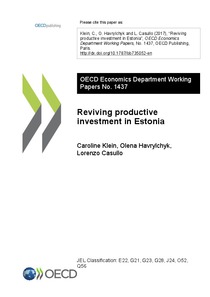Reviving productive investment in Estonia

Klein, Caroline ; Havrylchyk, Olena ; Casullo, Lorenzo
Organisation for Economic Co-operation and Development, Paris
OECD Publishing - Paris
2017
41 p.
investment ; investment policy ; labour market policy ; sustainable development ; innovation
OECD Economics Department Working Papers
1437
Financing and monetary policy
http://dx.doi.org/10.1787/bb735052-en
English
Bibliogr.
"Since the crisis, Estonia has experienced one of the most pronounced declines in the ratio of non-residential investment to GDP in the OECD. In addition, investment in intangible capital has remained well below OECD standards, partly explaining the low innovative capacities of typical Estonian firms. Uncertainty created by regional geopolitical tensions has played a role but poor investment performance stems from domestic factors too, such as a normalisation after the boom years, the lack of adequate skills and insufficient incentives for risk-taking. Improving lifelong learning and maintaining skilled mothers in employment can contribute to reducing shortages in skills needed by investors. Restructuring of insolvent firms should be eased to increase credit recovery and redirect capital to the most productive ones. Developing alternatives to bank funding can support investment in small and innovative firms. While there is room to improve the quality of infrastructure further, selection and prioritisation of projects should improve. Incentives for green investment, in particular to reduce pollution emitted by the oil shale industry and to achieve energy efficiency gains, could be strengthened."
Digital
The ETUI is co-funded by the European Union. Views and opinions expressed are however those of the author(s) only and do not necessarily reflect those of the European Union or the ETUI.